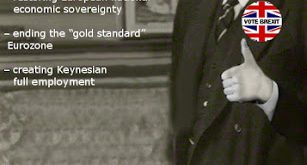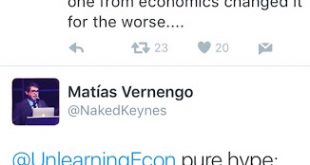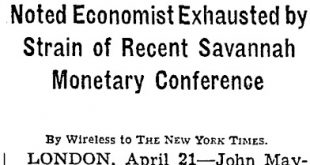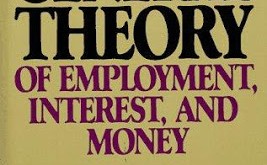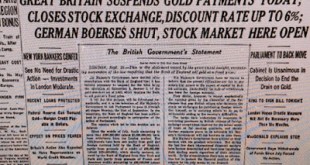If the Master were here... Just as Keynes condemned the interwar gold exchange standard in 1931, it is unlikely he would have had anything but contempt for the modern EU:[embedded content]
Read More »The great economic equations
A few days ago, Unlearning Economics twitted a link to an article on "The 17 equations that changed the world." Only one was an economic equation, The Black-Scholes one, and in all fairness it did not change the world, and is not even a central one in economics. First of all, Nassim Taleb has argued convincingly (for example, here) that Black, Scholes and Merton did not invent the formula, and what they really did was to provide a theoretical justification that was compatible with...
Read More »Keynes on Communism
Keynes visited the Soviet Union in the summer of 1925. He evidently tried hard to take a fair-minded view of Soviet Communism to please other people on the left, but just couldn’t do it.From his essay “A Short View of Russia” (1925): “Like other new religions, Leninism derives its power not from the multitude but from a small minority of enthusiastic converts whose zeal and intolerance make each one the equal in strength of a hundred indifferentists. .... Like other new religions, it...
Read More »70 years ago
Keynes (1883-1946) NYTimes Obituary here
Read More »Frank Knight on unemployment equilibrium
Luca Fiorito, my sometimes co-author, and Carlo Cristiano have published (subscription required) class notes from Frank H. Knight's business cycle course in the fall of 1936, that used Keynes' General Theory (GT) as one of his references. Two quotes from the notes by Perham Nahal are reproduced below. The main postulate of Keynes: the supply curve for labor should be drawn in terms of money, with no reference to the value of money (real vs. money wages). There is no tendency for the price of...
Read More »Davidson on Temin and Vines
Paul Davidson debates Peter Temin and David Vines in this INET working paper. I had criticized Temin and Vines before here and here. Although in general I agree with Paul, in my view, there is a problem with Keynes’ Bancor Plan kind of solution, that is the one that puts an emphasis on the need for surplus countries to carry the burden of external adjustment. It is really, in the world we live with a hegemonic currency, the role of the issuer of the international reserve currency to carry...
Read More »Lauchlin Currie’s review of Keynes’ General Theory
Curried Keynesianism in action The review with an intro can be read here (or here). Currie is often considered the first Keynesian in the Roosevelt administration (I suggested here that, while not a professional economist, that merit goes to Eccles), and was also the first to work in the White House, before the Employment Act and the creation of the Council of Economic Advisers (CEA). He was also later unjustly attacked as a Soviet spy, and Roger Sandilands has dealt with this here...
Read More »The relevance of Keynes’s General Theory after 80 years
By Thomas Palley, Louis-Philippe Rochon and Matías Vernengo*This year marks two important anniversaries in macroeconomics: the 80th anniversary of the publication of Keynes's The General Theory of Employment, Interest and Money (1936), and the 70th anniversary of Keynes's premature death, at the age of 63. To mark these anniversaries, the first issue of the fourth year of the Review of Keynesian Economics is dedicated to Keynes.The issue contains a symposium of papers titled ‘The...
Read More »Keynes rejected Wage and Price Flexibility as the Path to Full Employment even in Theory
This is a major error of neoclassical theory, and the mistaken view some people still attribute to Keynes: that wage and price flexibility in theory is still a reliable and effective mechanism for reaching full employment, even if the real world has wage and price rigidities. In fact, Keynes rejected that view.Curiously, even some Institutionalist economists have failed to understand it. For example, even Gardiner C. Means – the American Institutionalist who developed administered price...
Read More »The end of the Gold Standard
NYTimes September 21, 1931 84 years ago Britain left the Gold Standard. Some thought it was the end of Western civilization. Keynes thought it was the beginning of the end of the Depression, at least in Great Britain. He was certainly happy. He said: "There are few Englishmen who do not rejoice at the breaking of our gold fetters. We feel that we have at last a free hand to do what is sensible. The romantic phase is over, and we can begin to discuss realistically what policy is for the...
Read More » Heterodox
Heterodox

